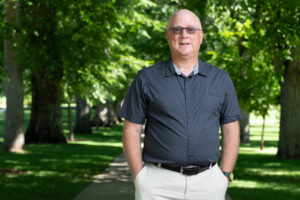
Bruce Draper, a distinguished computer scientist, has recently been announced as the Chair of the Department of Computer Science at Colorado State University. With a proven track record of academic excellence, he has made significant contributions to various facets of the discipline.
Holding a Ph.D. in computer science from the University of Massachusetts (Amherst), Draper’s research has spanned areas such as human-avatar interaction, gesture recognition and action recognition. His pioneering work delves into the integration of human communication with virtual avatars and intelligent systems, making significant strides in enhancing human-computer interaction.
Draper’s impactful career includes a tenure as a program manager in the I2O office at the Defense Advanced Research Projects Agency (DARPA) from 2019 to 2023, where he oversaw projects such as Perceptually-enabled Task Guidance, Geometries of Learning, and Guaranteeing AI Robustness Against Deception. Before assuming his current role, he served as a professor in computer science at CSU since 2011, where his research has greatly enriched the academic landscape.
Draper’s appointment heralds a new phase in his distinguished career. His profound insights and dynamic leadership are poised to elevate the department’s academic and research excellence, fostering a collaborative environment that advances the boundaries of computer science and human-computer interaction.
Welcome back from the summer! How does it feel to be back at Colorado State University and in Fort Collins?
I have spent the last four years commuting between Fort Collins and Washington D.C. while I worked as a Program Manager for DARPA. Returning to the mountains, people, and breweries of Fort Collins full time is a treat.
What motivated you to take on the role of department chair?
Like many faculty, I feel strongly about my colleagues and students, and I want CSU to have the best computer science department possible. The last four years at DARPA, however, gave me a broader perspective because I got to visit and work with computer science departments and companies all across the country, and I hope to bring the best practices I learned back to CSU.
What is your leadership philosophy, and how do you plan to apply it to your role as chair?
I view myself as a team leader blessed with a department full of smart, hard-working and independently minded people.
How do you plan to implement new uses of technology and ensure that the department remains competitive and relevant in a rapidly changing academic landscape?
As a computer science department, it’s not enough to remain competitive in a changing landscape – our job is to disrupt the landscape and drive the change. In the last few years, our field has created self-driving cars, augmented reality, AI-based chat bots, cyber-attacks and defenses. Our job is to teach this new state of the art in our classes while creating tomorrow’s technology in our research labs.
What are your top priorities and goals for the department in the coming years? Can you describe any specific initiatives or changes you intend to implement during your time as chair?
Computer science is no longer a niche field – it is now a core component of many disciplines. As a department we are looking to expand our interactions with other fields, for example we are looking at making a “Computing for Creatives” program, either as a concentration within the department or as part of a new Bachelor of the Arts program.
What do you believe are the strengths of the department, and how do you plan to build on them?
Intellectually we have strengths in cyber security, artificial intelligence, big data and scientific computing. Socially we have a collegial department that welcomes and nurtures students. The challenge is to maintain our social cohesiveness while growing and adding expertise in new areas of computer science.
How do you plan to involve students in decision-making processes within the department?
Formally, we have both graduate student and undergraduate student representatives on most of our department committees. Informally, students work closely with our faculty, and since much of what the department does is inspired bottom-up, students have the chance to be as involved with the department as they choose to be.